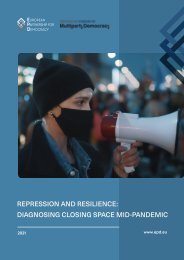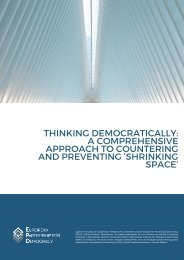NIMD Multi-Annual Strategy 2021-25
You also want an ePaper? Increase the reach of your titles
YUMPU automatically turns print PDFs into web optimized ePapers that Google loves.
8<br />
Democracy under pressure<br />
When <strong>NIMD</strong> started in 2000, liberal democracy was perceived as the inevitable end goal of a<br />
country’s development trajectory. Other political models were not considered viable alternatives.<br />
Today, liberal democracy is under pressure as a political system. In 2019, the quality of democracy<br />
decreased in over 80 countries, according to The Economist.<br />
The call for support to democracy is no longer an easily won argument. On the contrary, there seems<br />
to be a diverse coalition of the unwilling who are openly questioning (and in some cases actively<br />
undermining) the very concept of a democratic society governed by the rule of law and respect for<br />
human rights.<br />
Because of this new reality, we will need to make a compelling argument for democracy by showing<br />
our results in the public debate. Now more than ever. Democracy works, and we help make it work.<br />
All our programmes create space for dialogue and democratic change, from Myanmar to Colombia,<br />
and from Mali to Guatemala.<br />
A growing need to bridge the gap between the population and<br />
politicians<br />
In our analysis of the push back against democracy, there is one aspect we have not tackled yet. That<br />
is the growing disconnect, or tension, between the electorate and those elected, between the<br />
populations and decision makers.<br />
The main reason for this tension is that many countries have experienced an erosion in the credibility<br />
of democracy as the most adequate system for egalitarian societies. This erosion is mainly caused by<br />
the disillusion felt by many people in countries where the end of authoritarian regimes and the<br />
growth of democracy have not met the expectations of social justice and equal opportunities. In<br />
some of these countries, elected leaders are perceived to belong to a group of self-serving elites.<br />
The exasperation felt by populations increases all the more with the rapidly growing proportion of<br />
young people, who need education and jobs.<br />
Another, more subtle reason for this tension can be found in the paradox in our way of thinking<br />
about politicians. On the one hand, today's citizens want to have as much autonomy as possible in<br />
every choice they make. The information age and the rise of the internet make that possible. For all<br />
these informed individuals, it is increasingly difficult to accept that they have to delegate some<br />
power to elected politicians who, on top of that, sometimes take unpopular decisions. On the other<br />
hand, and this can be called a paradox, people are also demanding guidance in an uncertain world.<br />
They are looking for leaders who can offer some certainty and steer them towards a brighter horizon.<br />
Every disappointment carries the risk of leading to more frustration and disengagement, while not<br />
eliminating the need for guidance.

















